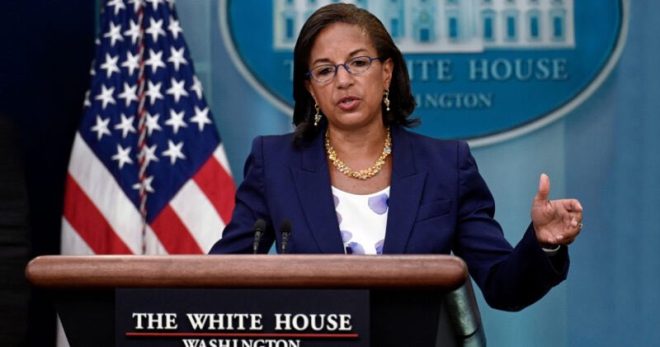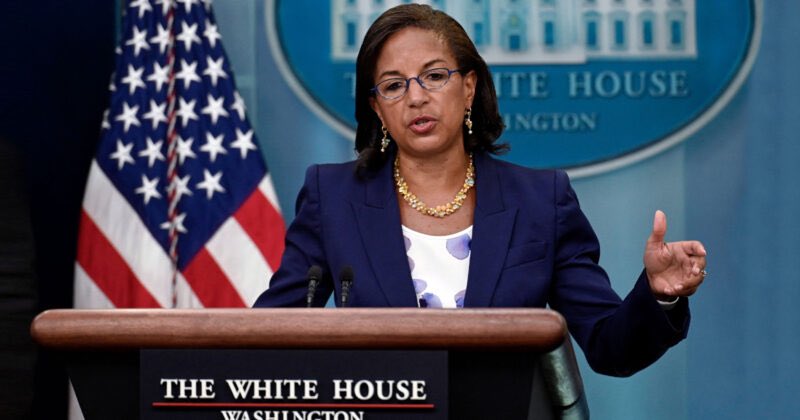
Breaking news: Defense Secretary Pete Hegseth Ends Service of All DOD Advisory Committee Members
In a significant move that has captured the attention of political analysts and defense experts alike, Defense Secretary Pete Hegseth has announced the termination of all committee members serving on the Department of Defense (DOD) advisory committees. This sweeping decision includes the notable seat held by Susan Rice, a prominent figure in American politics and former national security advisor.
Hegseth’s decision comes amid a broader initiative to realign the DOD’s advisory bodies with the department’s new strategic priorities. This shift aims to streamline operations and enhance the effectiveness of advisory roles within the military establishment.
The Implications of Hegseth’s Decision
The implications of Secretary Hegseth’s decision are far-reaching. By ending the service of all current committee members, the DOD is signaling a shift in governance and advisory approaches. The move raises questions about continuity, expertise, and the potential impact on ongoing defense initiatives.
1. Realignment of Strategic Priorities:
The DOD has been undergoing a series of changes to adapt to evolving national security challenges. Hegseth emphasized that the changes are necessary to align with the department’s new strategic goals. This includes a focus on modern warfare, cybersecurity, and international alliances.
- YOU MAY ALSO LIKE TO WATCH THIS TRENDING STORY ON YOUTUBE. Waverly Hills Hospital's Horror Story: The Most Haunted Room 502
2. Impact on Advisory Expertise:
The termination of seasoned experts, including Susan Rice, who has extensive experience in national security and foreign policy, could lead to a temporary gap in specialized knowledge. The DOD advisory committees typically comprise individuals with diverse backgrounds and expertise, and their absence may hinder the department’s ability to navigate complex defense issues effectively.
3. Political Reactions:
The decision has already sparked a wave of political reactions. Critics argue that this move reflects a partisan agenda that undermines the independence of defense advisory committees. Proponents believe that it is a necessary step to ensure that the DOD is aligned with the current administration’s vision.
What’s Next for the Department of Defense?
As the DOD embarks on this new chapter, many are left wondering what the future holds for its advisory committees. Here are some potential developments to watch for:
1. Appointment of New Members:
With the termination of existing members, the DOD will likely initiate a new selection process for advisory committee positions. This presents an opportunity to bring in fresh perspectives and expertise that align with the department’s evolving mission.
2. Changes in Committee Structure:
Hegseth’s decision may lead to a reevaluation of how advisory committees are structured. The DOD may explore new formats or frameworks to enhance collaboration and effectiveness among committee members.
3. Increased Focus on Modern Threats:
As national security threats continue to evolve, the DOD’s advisory committees may place greater emphasis on issues such as cyber warfare, artificial intelligence, and global military competition. The new members will likely be expected to address these contemporary challenges.
Conclusion
Defense Secretary Pete Hegseth’s decision to end the service of all DOD advisory committee members, including the influential Susan Rice, marks a pivotal moment in the Department of Defense’s approach to governance and advisory roles. The move reflects a commitment to realigning the department’s priorities and adapting to the complexities of modern security challenges.
As the situation unfolds, it will be crucial for stakeholders to monitor the appointment of new committee members and the potential restructuring of advisory bodies. The DOD’s ability to navigate this transition effectively will play a significant role in shaping the future of American defense policy.
In summary, this breaking news event highlights the dynamic nature of defense governance and the ongoing evolution of the DOD in response to changing global realities. It remains to be seen how these changes will impact national security strategies and the effectiveness of advisory committees moving forward.

BREAKING NEWS
Defense Secretary Pete Hegseth has ended the service of all committee members on DOD advisory committees.
This would include the seat held by Susan Rice.
Hegseth thanked the members for their work but said changes are needed to align with the department’s new https://t.co/PdQUuFKOoU
BREAKING NEWS
In a significant shift within the Department of Defense (DOD), Defense Secretary Pete Hegseth has announced the termination of all committee members serving on DOD advisory committees. This sweeping decision has raised eyebrows and sparked discussions across various platforms, especially concerning the implications it holds for current and future military policies. Among those affected is Susan Rice, who has held a prominent seat on one of these committees.
Understanding the Changes in DOD Advisory Committees
The DOD advisory committees play a crucial role in shaping military strategy and policy by providing expert advice and recommendations. These committees often comprise seasoned professionals from various sectors, including defense, technology, and international relations. However, with Secretary Hegseth’s recent announcement, all current committee members have been relieved of their duties. This includes influential figures like Susan Rice, whose experience and insights have been invaluable to the DOD.
Hegseth expressed gratitude to the outgoing members for their service, stating that their contributions were appreciated. However, he emphasized the need for changes to align with the department’s new direction. The specifics of this new direction remain somewhat vague, but it suggests a pivot toward a different strategic vision that may better meet the evolving challenges of national defense.
What Does This Mean for National Defense Policy?
So, what does this mean for the future of national defense policy? For starters, it signals a potential shift in the ideologies and approaches that have long been part of the DOD’s advisory framework. New members will likely bring fresh perspectives and innovative ideas that reflect current global dynamics. This change could be a strategic move to ensure that the DOD is better equipped to face contemporary threats, whether they come from cyber warfare, international terrorism, or other emerging challenges.
Moreover, the dismissal of such high-profile individuals raises questions about the influence of political ideology on military decision-making. As Hegseth takes the reins, we may see a more uniform approach to defense that aligns closely with the current administration’s policies. It’s crucial to monitor how these changes will affect not only military operations but also the overall defense strategy of the United States.
The Role of Susan Rice in DOD Advisory Committees
Susan Rice, a former National Security Advisor and U.N. Ambassador, has been an integral part of the DOD advisory committees. Her wealth of knowledge regarding foreign relations and national security has made her an essential asset in discussions that shape military policy. The fact that she is among those whose services have been terminated raises significant questions about the future direction of military advisory roles.
Rice’s experience in navigating complex geopolitical landscapes has been crucial in formulating strategies that address international threats. Her departure could mean a loss of continuity and expertise, particularly in areas requiring a nuanced understanding of global politics. However, it also opens the door for new voices and perspectives that may bring innovation and change.
Implications for Future Appointments
With the overhaul of DOD advisory committees, the next steps will be crucial. The Biden administration will need to appoint new members who can effectively address the pressing challenges facing national security. These appointments will likely reflect the administration’s priorities and could indicate a shift in focus toward particular areas such as cyber defense, climate change, and international diplomacy.
It’s important to note that the selection process will be scrutinized, especially by those who are concerned about the balance of expertise and political alignment within these committees. The DOD advisory committees have historically included a diverse range of viewpoints, and maintaining that diversity will be essential to ensure comprehensive and effective policy recommendations.
Reactions to the Announcement
The announcement has generated mixed reactions from various stakeholders. Some see it as a bold and necessary step toward modernizing the DOD’s approach to defense. Others view it as a politically motivated action that could undermine the quality of advisory input moving forward. Critics argue that the loss of experienced members could hamper the department’s ability to develop well-rounded strategies.
Advocates for the change, however, argue that it’s essential to bring in new perspectives that align with the current geopolitical climate. The global landscape is constantly evolving, and the DOD must adapt to these changes to maintain its effectiveness and readiness.
What’s Next for the Department of Defense?
As the dust settles from this announcement, the DOD will need to focus on how to rebuild its advisory committees effectively. This involves not only appointing new members but also establishing clear guidelines on how these committees will operate in the future. Transparency in the appointment process will be crucial in maintaining public trust and ensuring that the committees remain credible and effective.
Moreover, the DOD will need to engage with various stakeholders, including Congress and industry leaders, to ensure that the new advisory committees can provide the diverse expertise necessary for comprehensive defense strategies. Collaboration and communication will be key to ensuring that the DOD stays ahead of emerging threats and challenges.
Final Thoughts
Secretary Pete Hegseth’s decision to end the service of all committee members on DOD advisory committees marks a pivotal moment in the history of the Department of Defense. While the immediate implications may raise concerns about the loss of experienced voices like Susan Rice, it also presents an opportunity for renewal and innovation within military advisory frameworks.
As the nation navigates complex global challenges, the DOD’s ability to adapt and evolve will be essential. Keeping a close eye on the developments in this area will be crucial for anyone interested in the future of national defense policy. The landscape is shifting, and how these changes unfold will undoubtedly shape the future of military strategy and operations.
Stay tuned for further updates as this story develops. The implications of these changes will be felt for years to come, and understanding them is vital for anyone invested in the future of national security.
Breaking News, Cause of death, Obituary, Today
